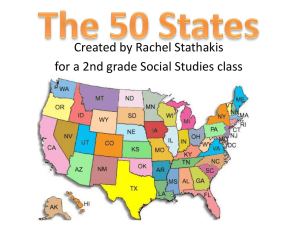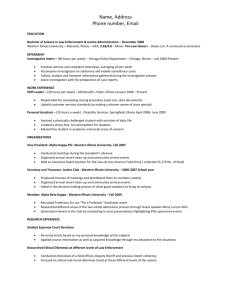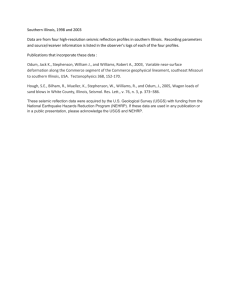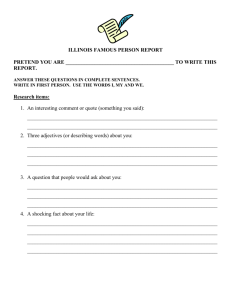What Helen Palsgraf Could Teach Illinois
advertisement
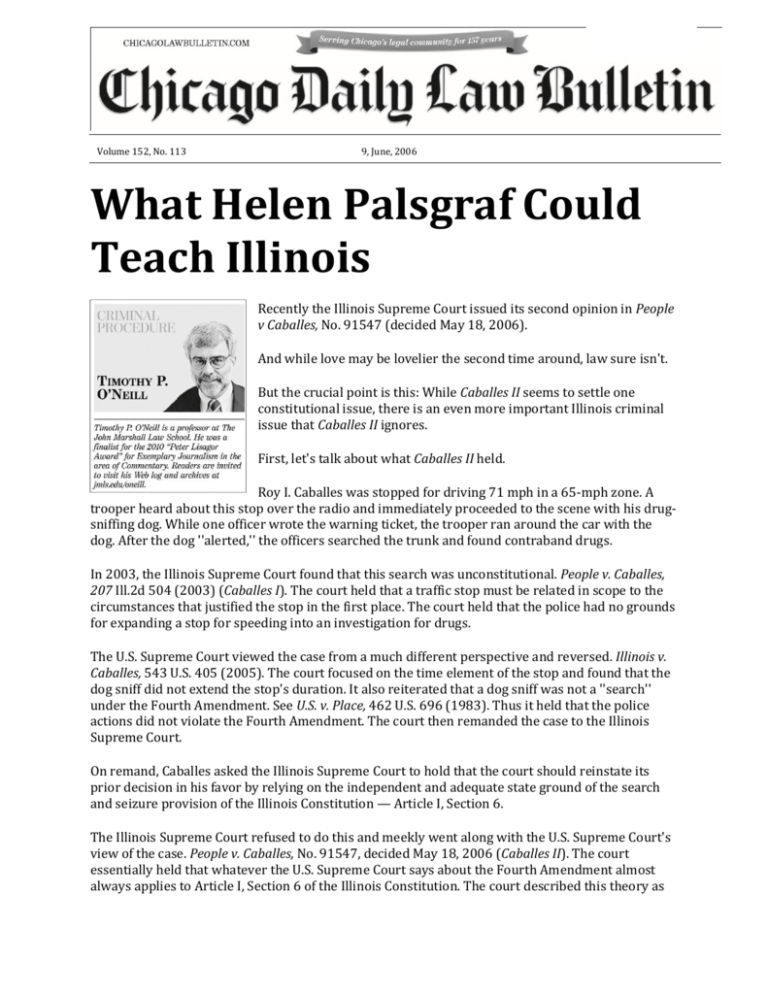
Volume 152, No. 113 9, June, 2006 What Helen Palsgraf Could Teach Illinois Recently the Illinois Supreme Court issued its second opinion in People v Caballes, No. 91547 (decided May 18, 2006). And while love may be lovelier the second time around, law sure isn't. But the crucial point is this: While Caballes II seems to settle one constitutional issue, there is an even more important Illinois criminal issue that Caballes II ignores. First, let's talk about what Caballes II held. Roy I. Caballes was stopped for driving 71 mph in a 65-mph zone. A trooper heard about this stop over the radio and immediately proceeded to the scene with his drugsniffing dog. While one officer wrote the warning ticket, the trooper ran around the car with the dog. After the dog ''alerted,'' the officers searched the trunk and found contraband drugs. In 2003, the Illinois Supreme Court found that this search was unconstitutional. People v. Caballes, 207 Ill.2d 504 (2003) (Caballes I). The court held that a traffic stop must be related in scope to the circumstances that justified the stop in the first place. The court held that the police had no grounds for expanding a stop for speeding into an investigation for drugs. The U.S. Supreme Court viewed the case from a much different perspective and reversed. Illinois v. Caballes, 543 U.S. 405 (2005). The court focused on the time element of the stop and found that the dog sniff did not extend the stop's duration. It also reiterated that a dog sniff was not a ''search'' under the Fourth Amendment. See U.S. v. Place, 462 U.S. 696 (1983). Thus it held that the police actions did not violate the Fourth Amendment. The court then remanded the case to the Illinois Supreme Court. On remand, Caballes asked the Illinois Supreme Court to hold that the court should reinstate its prior decision in his favor by relying on the independent and adequate state ground of the search and seizure provision of the Illinois Constitution — Article I, Section 6. The Illinois Supreme Court refused to do this and meekly went along with the U.S. Supreme Court's view of the case. People v. Caballes, No. 91547, decided May 18, 2006 (Caballes II). The court essentially held that whatever the U.S. Supreme Court says about the Fourth Amendment almost always applies to Article I, Section 6 of the Illinois Constitution. The court described this theory as ''limited lockstep.'' (Slip op. 16) Limited lockstep, the court went on, is ''based on the premise that the drafters of the 1970 constitution and its delegates to the constitutional convention intended the phrase 'search and seizure' in the state document to mean, in general, what the same phrase means in the federal constitution.'' Id. Over the years, justices such as Seymour Simon, William Clark, and James D. Heiple have disagreed with this, and have vigorously argued that Illinois courts have a solemn duty to independently interpret the Illinois Constitution. See People v. Hoskins, 101 Ill.2d 209, 236 (1984) (Simon, J., dissenting); People v. Tisler, 469 N.E.2d 147, 163 (Clark, J., concurring specially); People v. Mitchell, 650 N.E.2d 1014, 1025 (Heiple, J., dissenting). Moreover, if Caballes II is correct that Article I, Section 6 is basically a cut-and-paste version of the Fourth Amendment, you might wonder why the convention delegates even bothered to write a new state constitution at all. ''Limited lockstep'' turns Article I, Section 6 into a vestigial organ — similar to the appendix, the tailbone, or the sex organs of dandelions — that no longer serves much of any purpose. Caballes II relegates Article I, Section 6 to the Department of Redundancy Department. But, hey, ''limited lockstep'' is the Illinois Supreme Court's story and they are sticking to it. Which brings us to the second issue, an issue that Caballes II never discussed and that still needs to be resolved: why, in the name of Blackstone, did the Illinois Supreme Court ever allow its decision in Caballes I to be reviewed by the U.S. Supreme Court in the first place? This issue has absolutely no connection to ''limited lockstep.'' And to begin to answer it we need to look at Helen Palsgraf. Yes, that Helen Palsgraf. You may recall that Helen Palsgraf was the mother of three who had the misfortune of riding the Long Island Railroad when a passenger's bag of fireworks fell on the tracks and exploded. The explosion caused some scales at the other end of the platform to fall on Palsgraf, resulting in injuries. She then sued the railroad, and won in both the trial court and in the appellate division. However, the New York Court of Appeals held against her in a 4-3 decision. Palsgraf v. Long Island Railroad Co., 248 N.Y. 339 (1928). The opinion by Justice Benjamin Cardozo is one of the most famous in U.S. legal history. Yet Judge John T. Noonan Jr., in his remarkable book Persons and Masks of the Law (1976), focused on a little-noted aspect of the case. The last line of Cardozo's opinion off-handedly imposed both her own court costs and the railroad's court costs on Palsgraf. And the court did not have to do this; imposition of costs was discretionary with the court. The court costs amounted to around $350. The Long Island Railroad at that time had a net annual income of $4,000,000; Palsgraf earned $416 per year as a janitor. It would have taken Palsgraf almost one year to pay for the court costs; it would have taken the Long Island Railroad around one hour to pay these costs. And, yes, a New York statute would have allowed the railroad to execute this judgment through seizure of Palsgraf's personal property. Was Cardozo an evil man? Of course not. But Noonan uses this as an example of how law places ''masks'' over people, reducing individuals to ''plaintiffs'' and ''defendants'' and blotting out aspects of the case that — although perhaps not legally relevant — are certainly morally relevant. It probably never occurred to Cardozo to consider Palsgraf's yearly income. Relate this to Roy Caballes. Way back in 2003 in Caballes I, the highest Illinois court found that Illinois police violated the constitutional rights of an Illinois defendant. Caballes I held that the Fourth Amendment and — a fortiori, under ''limited lockstep'' — Article I, Section 6 of the Illinois Constitution were violated by the actions of the police. Why wasn't this the final decision? Why should Roy Caballes have had to defend his Illinois Supreme Court victory before the U.S. Supreme Court? What possible interest could the U.S. Supreme Court have in a case in which the highest Illinois court vindicated the rights of an Illinois defendant against the actions of Illinois police? The answer is: Absolutely none — unless the Illinois Supreme Court unnecessarily bases its decision on the Fourth Amendment. But that is exactly what Caballes I did, thus conferring jurisdiction on the U.S. Supreme Court. But, you ask, why was the Illinois Supreme Court's reliance on the Fourth Amendment unnecessary? The first part of the answer is simply based on elementary logic. It goes back to the 14th century philosopher William of Ockham, who established the principle known as ''Ockham's Razor.'' The best summary of this principle is: ''All things being equal, the simplest explanation is the best one.'' In search and seizure, Ockham's Razor would find that it is redundant for an Illinois court to base a search and seizure decision on both the Fourth Amendment and Article I, Section 6 of the Illinois Constitution. ''Limited lockstep'' means that a Fourth Amendment violation is, a fortiori, an Article I, Section 6 violation. Reliance on both provisions violates Ockham's Razor. Reliance on the Illinois Constitution will suffice, thus resulting in the decision being based on an ''independent and adequate state ground.'' Therefore, the decision is final and the U.S. Supreme Court would have no jurisdiction. But Helen Palsgraf reminds us that there is a human side to this issue as well. Relying on the Illinois Constitution provides an independent and adequate state ground that insulates the state court decision from U.S. Supreme Court review. Michigan v. Long, 463 U.S. 1032 (1983). But when the Illinois Supreme Court thoughtlessly based Caballes I on the Fourth Amendment, it denied Caballes the finality he deserved. The court forced him to pay for completely unnecessary rounds of briefing and argument in both Washington and Springfield — and, ultimately, took away the victory he achieved in Caballes I. And this is not a unique situation. Illinois appellate courts have repeatedly refused to use independent and adequate state grounds to insulate pro-defense decisions from U.S. Supreme Court review. See, e.g., Illinois v. Lidster, 124 S.Ct. 885 (2004); Illinois v. McArthur, 531 U.S. 326 (2001); Illinois v. Wardlow, 528 U.S. 119 (2000); Illinois v. Rodriguez, 497 U.S. 177 (1990); Illinois v. Batchelder, 463 U.S. 1112 (1983); Illinois v. Andreas, 463 U.S. 765 (1983); Illinois v. Lafayette, 462 U.S. 640 (1983); Illinois v. Gates, 462 U.S. 213 (1983). This means that defendants — and, in the case of indigents, Illinois taxpayers — have been repeatedly forced to pay who-knows-how-many thousands of dollars in attorney fees and costs for completely unnecessary U.S. Supreme Court review. Why do Illinois appellate courts persist in depriving victorious Illinois defendants of the finality of their Illinois appellate victories? Are Illinois appellate courts even aware of the doctrine of ''independent and adequate state grounds''? You would like to believe they are. And yet a quick search on LEXIS indicates that since the adoption of the new Illinois Constitution, for every case that cites Article I, Section 6 you can find about 13 cases that cite the Fourth Amendment. Illinois appellate courts appear to believe that the Fourth Amendment is ''real law.'' Conversely, Article I, Section 6 — Illinois' legal version of male nipples — seems to be regarded merely as part of a faux Constitution. ''Limited lockstep'' defines the substance of Article I, Section 6. But ''limited lockstep'' has absolutely no bearing on the failure of Illinois courts to protect their pro-defense decisions — and both taxpayers' and defendants' pocketbooks — from the needless expense of U.S. Supreme Court review. Let the U.S. Supreme Court make search and seizure law by reviewing federal cases. ''Limited lockstep'' can then incorporate those holdings into Article I, Section 6. But don't force Illinois defendants and taxpayers to pay legal fees for completely unnecessary review of pro-defense Illinois appellate decisions by the U.S. Supreme Court. And don't turn the Illinois Supreme Court into nothing more than a judicial ''yes man,'' an intermediate court that might as well be called the U.S. Court of Appeals for the Illinois Circuit. Illinois defense attorneys must become educators. They must explain to Illinois appellate courts — slowly, patiently, again and again — the basic principles of federalism that underlie Michigan v. Long. They must encourage Illinois appellate courts to view themselves as more than just speed bumps on the way to the U.S. Supreme Court. And they must explain why belief in ''limited lockstep'' is entirely consistent with the use of independent and adequate state grounds.



